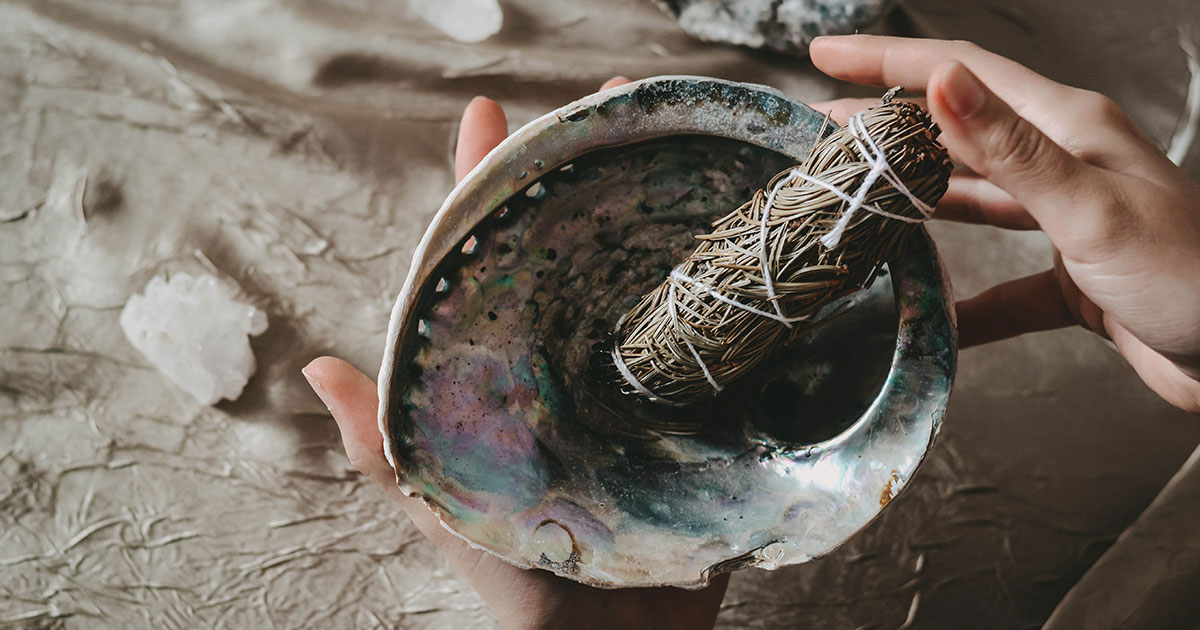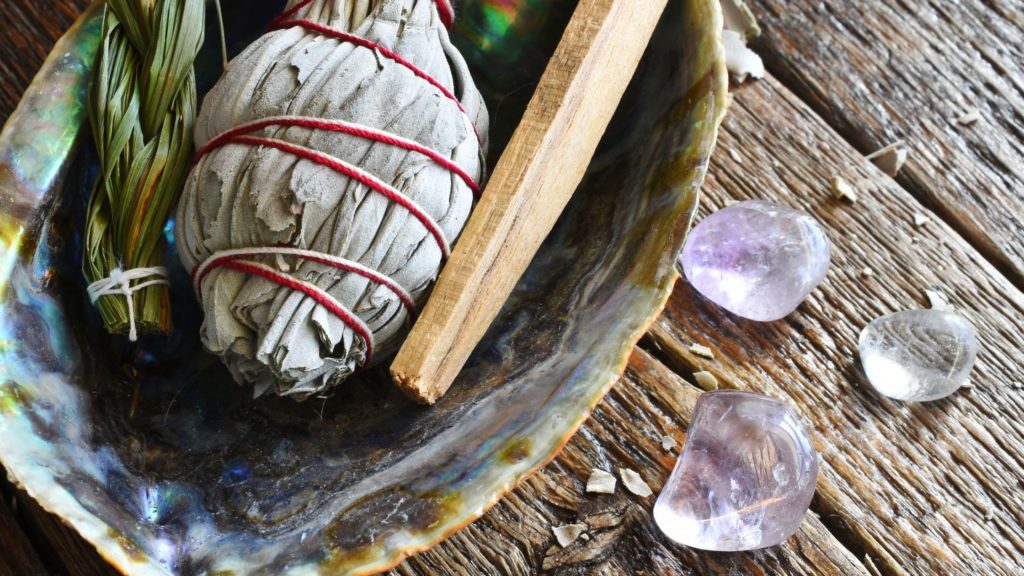Smudging for Beginners: Nothing but Positive Vibes and Healing
March 7, 2022

Smudging for Beginners: Nothing but Positive Vibes and Healing
Smudging is a ritual of burning sacred herbs that indigenous tribes have used for thousands of years to remove evil spirits and make room for uplifting, healing energy. The use of smudging techniques has been established as a Native American cultural and tribal practice in tribes such as the Lakota, Chumash, Cahuilla, and numerous others—though it is important to note that it is not practiced in all tribes.
Smudging practices can also be found in other cultures all around the globe. What each of these cultures and traditions share is the basic belief that smudging can help clear a person or space of negative energy. Thus, its practice allows for positivity and healing to take place.
 Before you can begin smudging, there are a few basic tools you will need. You’ll find that some of these are optional, and your choice of tools truly depends on what your intentions are regarding the smudging ritual. In general, you will need:
Before you can begin smudging, there are a few basic tools you will need. You’ll find that some of these are optional, and your choice of tools truly depends on what your intentions are regarding the smudging ritual. In general, you will need:
 Once your intentions are clear, other people and animals have been removed, and you have a window open, it is time to begin the smudging process. The exact process can vary, but we’ve outlined the general procedure in five steps and tips:
Once your intentions are clear, other people and animals have been removed, and you have a window open, it is time to begin the smudging process. The exact process can vary, but we’ve outlined the general procedure in five steps and tips:
 There is a reason smudging has been used for centuries and continues to be a frequent ritual for many today. In fact, smudging offers a wide range of benefits.
There is a reason smudging has been used for centuries and continues to be a frequent ritual for many today. In fact, smudging offers a wide range of benefits.
 While smudging is a deeply-held cultural practice, the process doesn’t have to be complicated—especially for beginners. You can use this resource to help guide unpracticed users through the smudging basics. Keep in mind that what matters most is understanding your intentions behind the smudging process.
With clear intentions, you’ll have a guided focus throughout the process. Success with the smudging ritual relies on intuition and listening to the energy inside of yourself. When you proceed with the proper internal guidance, you’ll find that smudging has numerous benefits that can impact all areas of your life. With the right tools and intentions, you’ll soon begin to experience healing and positivity.
While smudging is a deeply-held cultural practice, the process doesn’t have to be complicated—especially for beginners. You can use this resource to help guide unpracticed users through the smudging basics. Keep in mind that what matters most is understanding your intentions behind the smudging process.
With clear intentions, you’ll have a guided focus throughout the process. Success with the smudging ritual relies on intuition and listening to the energy inside of yourself. When you proceed with the proper internal guidance, you’ll find that smudging has numerous benefits that can impact all areas of your life. With the right tools and intentions, you’ll soon begin to experience healing and positivity.
Why Is Smudging Important Today?
Today, smudging continues to be used to help individuals or families purify themselves, an object, or an entire space—but what makes smudging so important? Cultures that practice smudging believe that throughout our day-to-day lives, people encounter others and experience a variety of situations. These encounters cause us to carry energy from space to space. After some time, this energy transfer can lead to a build-up of stagnant energy, which is what leads to feelings of impeded inspiration or apathy. Stagnant energy can cause us to feel stuck, which can eventually lead to feelings of anxiety or depression. Smudging helps to remove stagnant, negative energy to make room for more positive energy. So, how can you get started? When it comes to smudging for beginners, there are a few smudging basics to consider. These include your choice of smudging herbs or resins, setting your intentions, the process itself, and the completion of the smudging event.Smudging Tools
 Before you can begin smudging, there are a few basic tools you will need. You’ll find that some of these are optional, and your choice of tools truly depends on what your intentions are regarding the smudging ritual. In general, you will need:
Before you can begin smudging, there are a few basic tools you will need. You’ll find that some of these are optional, and your choice of tools truly depends on what your intentions are regarding the smudging ritual. In general, you will need:
-
A sage bundle or smudge stick
-
A seashell or a bowl made of ceramic, clay, or glass
-
Matches
-
Feather or fan
Setting Your Intentions
One of the most important smudging basics is the process of setting your intentions. You must have a clear focus in mind regarding what you intend to get out of the smudging ritual. By setting your intentions, you help to strengthen the practice of what you are doing. You can begin by asking yourself, “what do I want out of this?” Then, make an effort to understand your specific needs. Many consider the process of tailoring your intentions to your specific needs the “smudging prayer.” Once you have your purpose in mind, remove any animals or people from the space you intend on cleansing. It is also important that you leave a window open before, during, and after smudging so that the smoke has a place to escape. Many believe that the smoke is what takes the impurities and negativity away from their original location, so it is important that the smoke can leave your environment.The Smudging Process
 Once your intentions are clear, other people and animals have been removed, and you have a window open, it is time to begin the smudging process. The exact process can vary, but we’ve outlined the general procedure in five steps and tips:
Once your intentions are clear, other people and animals have been removed, and you have a window open, it is time to begin the smudging process. The exact process can vary, but we’ve outlined the general procedure in five steps and tips:
1. Light the Sage
You’ll want to take your match and light the end of the sage bundle. You’re looking for a slow burn, so if the bundle does catch fire, quickly blow out the flame.2. Direct the Smoke
The tips of the leaves within the bundle should smolder slowly, releasing a cloud of thick smoke. You’ll want to direct this smoke around your body, an intended object, or the intended space you are targeting for removal of negative vibes. Direct the smoke around your body and space with one hand (or use a feather if you choose) while holding the bundle in the other. Small spaces tend to hold stagnant energy, so be sure to direct smoke around doors and windows, into closets, and into corners.3. Let Your Intent Guide You
Take your time with the process as the smoke spreads and allow the incense to linger on areas of your body or surroundings that have drawn your focus. This is where a fan or feather can prove helpful. While moving throughout your space, many recommend moving clockwise around your home, finishing where you started. However, your path can vary depending on your cultural understanding of the purpose, as well as your specific needs. While you are smudging, this portion of the process relies on intuition and letting what feels right guide you.4. Prevent Stagnant Smoke
Preventing stagnant energy is why it is so important to keep your space as open as possible. In particular, be sure to leave at least one window open. The goal is to keep the smoke moving throughout your home. There should be a light haze drifting through the spouse versus dense clouds of smoke. As you are moving throughout the home or around the person, allow the ash to collect in the shell or bowl.5. Never Leave Your Sage Bundle Unattended
Once you’ve completed the smudging process, you may still have some of your sage bundle left. Many people prefer to be sure that the sage bundle is completely extinguished. This can be done by dabbing the lit end against the bowl. Others prefer to let the sage burn out naturally. Once completely extinguished, storing any remaining sage in a safe, dry place that is out of the sun. Regardless of how you complete the process, take care to never leave a lit sage bundle unattended.Benefits of Smudging
 There is a reason smudging has been used for centuries and continues to be a frequent ritual for many today. In fact, smudging offers a wide range of benefits.
There is a reason smudging has been used for centuries and continues to be a frequent ritual for many today. In fact, smudging offers a wide range of benefits.
-
Purifying
-
Dispelling Negative Energy
-
Improving Sleep Quality
-
Smudging as a Spiritual Tool
-
Cleansing
Start Smudging for Beginners
 While smudging is a deeply-held cultural practice, the process doesn’t have to be complicated—especially for beginners. You can use this resource to help guide unpracticed users through the smudging basics. Keep in mind that what matters most is understanding your intentions behind the smudging process.
With clear intentions, you’ll have a guided focus throughout the process. Success with the smudging ritual relies on intuition and listening to the energy inside of yourself. When you proceed with the proper internal guidance, you’ll find that smudging has numerous benefits that can impact all areas of your life. With the right tools and intentions, you’ll soon begin to experience healing and positivity.
While smudging is a deeply-held cultural practice, the process doesn’t have to be complicated—especially for beginners. You can use this resource to help guide unpracticed users through the smudging basics. Keep in mind that what matters most is understanding your intentions behind the smudging process.
With clear intentions, you’ll have a guided focus throughout the process. Success with the smudging ritual relies on intuition and listening to the energy inside of yourself. When you proceed with the proper internal guidance, you’ll find that smudging has numerous benefits that can impact all areas of your life. With the right tools and intentions, you’ll soon begin to experience healing and positivity. Jenny Weatherall
CEO, Business Owner, Digital Marketer, SEO Strategist and Writer.
Jenny Weatherall is the co-owner and CEO of Eminent SEO, a design and marketing agency founded in 2009. She has worked in the industry since 2005, when she fell in love with digital marketing… and her now husband and partner, Chris. Together they have 6 children and 3 granddaughters.
Jenny has a passion for learning and sharing what she learns. She has researched, written and published hundreds of articles on a wide variety of topics, including: SEO, design, marketing, ethics, business management, sustainability, inclusion, behavioral health, wellness and work-life balance.
Related Posts
Search
Categories
Tags
Apothecary
Aquarius
Aries
Astrology
Beauty Review
Burlesque
Cancer
Capricon
Chakras
Color
Crystals
Dancing
DIY
Energy
Feng Shui
Focus
Gemini
Hair
Hair Products
Halloween
Herbs
History
Horoscope
Horoscopes
How To
Leo
Mental Health
Mercury Retrograde
Pisces
Positivity
Productivity
Product Review
Sagittarius
Scorpio
Self Improvement
Stickers
Stress
Style
T-shirts
Taurus
Trends
Women’s History Month
Work environment
Yoga
Zodiac










